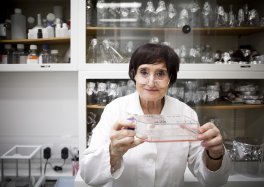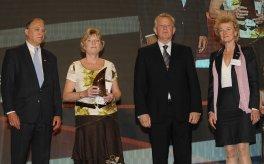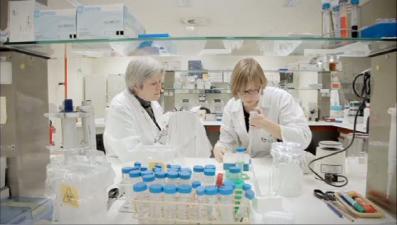Blanka Říhová
Synthetic polymeric drugs to combat cancer
Chemotherapy has for some time been considered the most effective treatment to combat cancer. One of its main drawbacks, however, is that its cytotoxic effects do not just reach the tumour cells but those that surround it. Blanka Říhová has worked at developing a more targeted treatment, researching a particular method of treatment that not only targets tumour cells but even appears to increase immune function.
Cancer is one of the world's primary diseases, accounting for 13% of all human deaths in 2007. There are many different types of cancer; they affect parts of the body in varying ways, and treatment remains tricky.
Chemotherapy remains the primary method of treatment. However, physical side effects include hair loss and intense nausea causing a severe loss of appetite, which can lead to cachexia. Also known as wasting syndrome, cahexia causes symptoms such as weight loss, fatigue and loss of muscle mass.
These physical maladies are the result of the non-specific nature of chemotherapy. The cytotoxic compounds do not reach tumour cells alone. It has a particularly detrimental effect on those cells which rapidly divide including cells of the hair follicles, immune and reproductive systems as well as those that line the digestive tract.
Blanka Říhová, currently Head of Department of Immunology and Gnotobiology, Academy of Sciences of the Czech Republic, v.v.i. (2000 - 2007, Director of the Institute of Microbiology in Prague, Czech Republic), and her team have, in close collaboration with the team of professor Karel Ulbrich, Institute of Macromolecular Chemistry, Academy of Sciences of the Czech Republic, v.v.i. strived to develop a more targeted treatment with positive results. Her research has enabled the development of several anti-cancer drugs with specific anti-tumour targeting mechanisms.
The combination of the drugs' increased specificity and efficacy along with the ability to enhance the immune system's response to the tumour cells themselves reduce the chances of new tumours developing later on.
In addition, the mitigation of toxic side effects they have the potential to reduce the frequency and length of patients' hospital stays, easing financial stressors in an already mentally and emotionally taxing time.
Říhová is not only a prolific inventor and researcher, named in over 20 patents, she has also received numerous awards and prizes for her research, including: a 2005 Medal of the Senate of the Parliament of the Czech Republic; the 2005 "Česká hlava" medal, an award for her invention in the field of Polymeric drugs; the 2005 Medal of the Faculty of Science, Charles University and a Medal of the Faculty of Medicine, Chiang Mai University, Thailand, in 2000, to name but a few.
She has also served in some of the Czech Republic's most remarkable and prestigious scientific societies, including the Czech Learned Society, the European Academy of Sciences, the European Science Foundation and the American Association for Cancer Research, and has served as a professor to universities in the Czech Republic and USA.
Contact
European Inventor Award and Young Inventors Prize queries:
european-inventor@epo.org Subscribe to the European Inventor Award newsletterMedia-related queries:
Contact our Press team#InventorAward #YoungInventors



